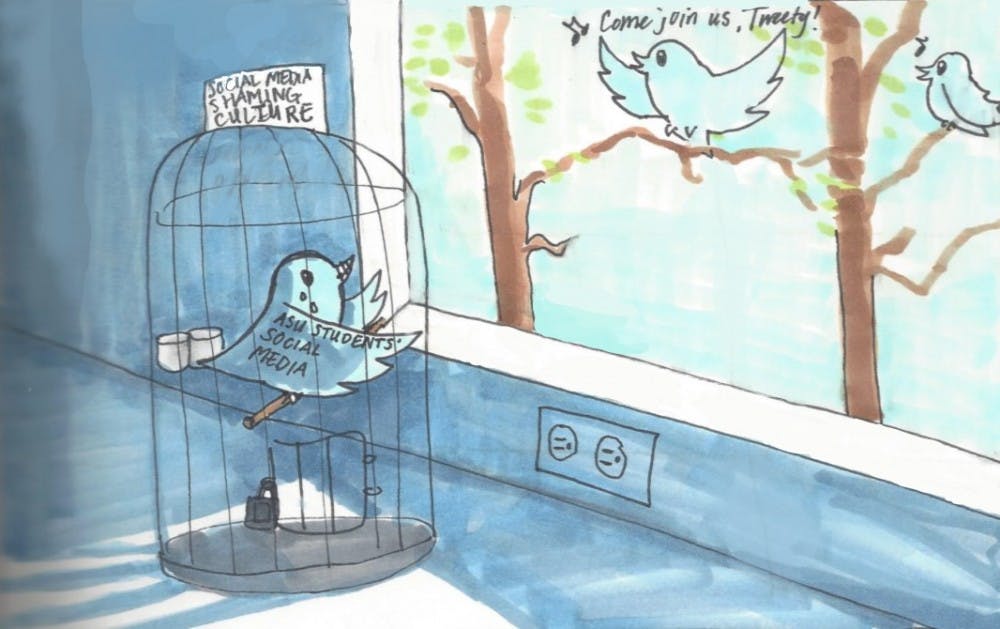Growing up in the age of social media presents a new challenge.
In a time where the general understanding of free speech has radically changed, this generation’s youth faces a unique situation. Now that the entire world has been given a voice, there is an active and responsive audience to hear their opinions through social media.
Those with controversial, niche or minority opinions now have an opportunity to have their voices heard at a much larger scale than before, frequently facing backlash.
Often, these online interactions lead to real-life repercussions. However, these consequences are necessary in free speech and civil discussions on social media because they hold people accountable and are legally fair game.
The First Amendment provides sweeping guarantees of protection for public and private speech of nearly all types.
However, the First Amendment has never protected people from facing consequences such as public backlash, and it doesn't protect speech that's libelous, defamatory, dangerous or in some instances obscene.
While it’s important to let those with niche opinions have their voices heard, it’s just as important for their opposers to disagree as well, even if consequences can be extreme.
Public backlash is just as much a valid practice of free speech as allowing those with controversial opinions to publicly voice their beliefs. It facilitates the discussion of what is right and what is wrong when it comes to issues. Additionally, it reflects what the majority believes in when faced with an opposing opinion.
Discussion is an essential component of free speech. Backlash, while seemingly harsh, can hold citizens accountable for what they say.
The New York Times article, “How One Stupid Tweet Blew Up Justine Sacco’s Life,” detailed the consequences that Sacco, former director of communications for IAC, faced after tweeting an offensive joke.
Following her offensive tweet, she faced extreme online backlash. The New York Times mentioned that Sacco received tens of thousands of angry tweets, became the number one worldwide trend on Twitter and co-workers publicly called for her to be fired.
Michigan State University student, Jillian Kirk, went viral on Twitter for several posts including offensive comments. Kirk later issued a public apology and a statement of accountability only after public backlash called for her expulsion.
According to Joseph Russomanno, an associate professor of various freedom of expression and First Amendment law classes at the Walter Cronkite School of Journalism and Mass Communication, these consequences are legally permissible.
“Free speech doesn't mean freedom from consequences,” Russomanno said. “In fact, that in it of itself is an element of free speech.”
According to Russomanno, in scenarios involving these types of public backlash, nothing would call for any kind of government intervention.
Public backlash on social media is just one of the consequences that is allowed within the understanding of the First Amendment.
Without that backlash, it is easy for students and users to brush their mistakes under the rug, but facing the consequences from peers and others on social media encourages transparency and meaningful discussion on these sensitive issues.
Allowing those on all sides of an issue to express their beliefs and discuss their reasoning is essential to growth. The First Amendment was created to protect that discussion, and digital backlash is just part of that – the discussion.
Editor's note: This story has been updated to correct a paragraph describing the corrections extended by the First Amendment.
Reach the columnist at jreksodi@asu.edu and follow @jfreksodiputro on Twitter.
Editor’s note: The opinions presented in this column are the authors’ and do not imply any endorsement from The State Press or its editors.
Want to join the conversation? Send an email to opiniondesk.statepress@gmail.com. Keep letters under 500 words and be sure to include your university affiliation. Anonymity will not be granted.
Like The State Press on Facebook and follow @statepress on Twitter.




